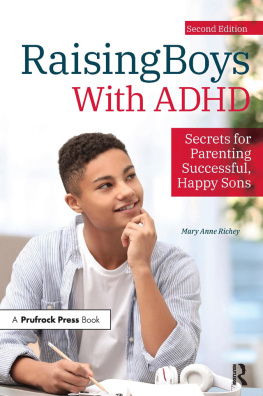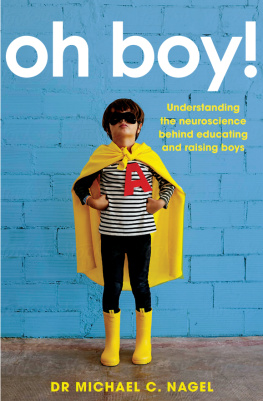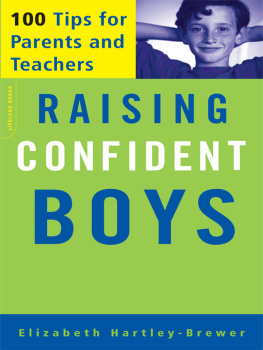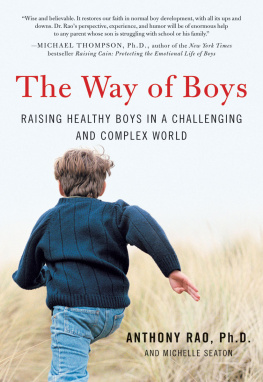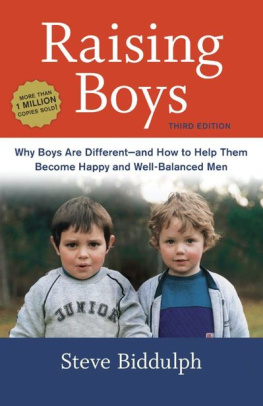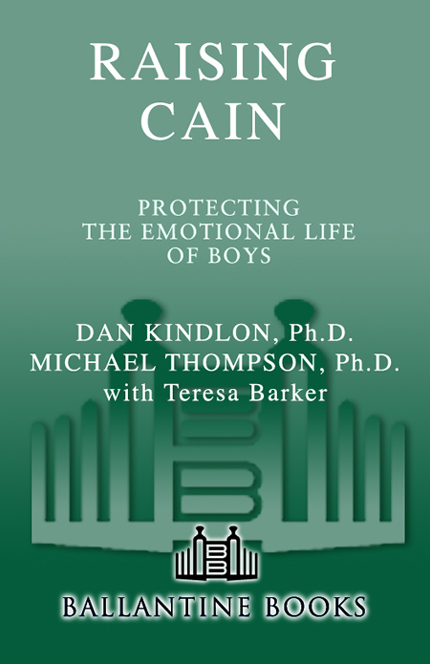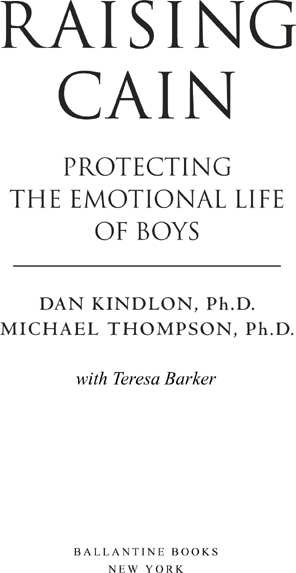Chapter 1.
Chapter 2.
Chapter 3.
Chapter 4.
Chapter 5.
Chapter 6.
Chapter 7.
Chapter 8.
Chapter 9.
Chapter 10.
Chapter 11.
Chapter 12.
Preface to the Paperback Edition
T he hardcover edition of Raising Cain was published on April 8, 1999, just twelve days before the shootings at Columbine High Schoolmaking our choice of title more prescient than we intended. As a result of that tragic murderous rampage and suicide by two high school boysfollowing as it did on the heels of similar tragedies in other citiesthe national dialogue turned to anguished questions about angry and violent boys. How could this happen? What made them do it? Why this epidemic of school violence? And, as one boy asked us in a school assembly two days after the shootings, Why didnt their parents know what was going on with those two guys?
These events shocked us all, and, at times, the dialogue moderated by the news media bordered on hysteria. National statistics clearly show that school violence nationwide is actually down, and many school administrators in poor urban neighborhoods were dismayed by the amount of attention given to violent incidents in suburban schools following decades of bloodshed in their own schools. Nonetheless, beneath the often-politicized debate about the causes of boy-generated violence, important, previously overlooked issues were being addressed.
The Columbine tragedy cast a spotlight on some of the hidden boy problems we discuss in this book, such as the adolescent culture of cruelty that preys on unpopular or nonconformist boys, and the high cost to all of us of the emotional illiteracy thats so common among boys and men. As the national discussion evolved from a focus on the psyches of Dylan Klebold and Eric Harris to issues that affect many boysthe climbing suicide rate, binge drinking, steroid use, undiagnosed depression, academic underachievement, and the disproportionate representation of boys among car crash victimsthe discourse moved beyond simple sound-bites.
As child psychologists who have worked extensively with boys, we hope we can offer insight into boy behavior and feelings that others might not easily see or understand. Our experiences with parent audiences and reporters across the country have left us feeling both encouraged and discouraged about peoples grasp of the emotional life of boys. We are disheartened that the media continues to look for simple answers, such as the theory that testosterone causes violent behavior, to explain the complex psychology of boys. We were upset to hear Governor Jesse Ventura, appearing with us on a talk show, advocate the return of corporal punishment in Minnesota schools with the glib assertion, I was paddled as a boy, and it didnt hurt me. It was just humiliating. Hitting or humiliating boys is not the answer to our problems, nor is putting boys in boot camps.
On the hopeful side, we have been thrilled by the huge turnout of fathers at our talks about raising boys; typically, it is mothers who attend parenting lectures. We have been moved by the number of men who have come up to us to share their own stories or to thank us for giving them permission to show tenderness toward their boys. I was raised in a macho family, where we didnt touch much, said one father. Now I have eleven-year-old and eight-year-old boys, and we hug a lot. You made me feel like I was doing the right thing. We have laughed and been gratified when we heard from women, such as the one who told us, Ive read all the books on boys, but this is the one that made me understand both my son and my husband!
To be honest, writing Raising Cain has also been a significant psychological journey for the two of us. We have revisited our boyhoods, our relationships with brothers, fathers, and friends, and emerged with a deeper understanding about how the events of the past continue to influence us. We have had to come to terms with areas of our own emotional illiteracylimitations that became painfully obvious as we struggled to deal, man-to-man, with creative differences that emerged during the writing of this book. We understand ourselves better, as boys, men, husbands, and fathers as a result of this collaboration. We hope that Raising Cain will guide our readers, women and men, on a similar journey into the souls of boysa journey that reveals how boys suffer, how they love, and, most of all, how they often remain emotionally illiterate in pursuit of a caricature of strong, silent masculinity.
Dan Kindlon, Ph.D.
Michael Thompson, Ph.D.
Introduction
W e are two male psychologists who have specialized in treating boys for more than thirty-five years of our combined practice. From the earliest days in our training, we have been sent the angry boys, the boys who kick things, and especially the boys who dont talk. We have played pool and basketball with our patients and called it therapy. We have talked with boys while building Lego structures with them. We have discussed family problems with boys as we lined up plastic soldiers preparing for a major battle. We have left our offices to make trips across the street to the Store 24 to purchase junk food and returned to the office to eat it, discussing the relative merits of Mountain Dew and Surge in our efforts to make contact. We have conducted therapy sessions walking the streets of Cambridge or sitting in pizza parlors, in diners, in cars. We have had boys jump on our couches and leap to the floor with alarming thumps. We have had colleagues from downstairs call to complain about the amount of noise going on in our therapy sessions. All we could do was apologize: Were very sorry. Of course, therapy should be quiet. It should involve talking, not jumping. But were doing therapy with boys here!



